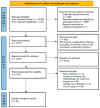Microbiota in Autism Spectrum Disorder: A Systematic Review
- PMID: 38068995
- PMCID: PMC10706819
- DOI: 10.3390/ijms242316660
Microbiota in Autism Spectrum Disorder: A Systematic Review
Abstract
Autism spectrum disorder (ASD) is a complex neurodevelopmental condition characterized by several core symptoms: restricted interests, communication difficulties, and impaired social interactions. Many ASD children experience gastrointestinal functional disorders, impacting their well-being. Emerging evidence suggests that a gut microbiota imbalance may exacerbate core and gastrointestinal symptoms. Our review assesses the gut microbiota in children with ASD and interventions targeting microbiota modulation. The analysis of forty-four studies (meta-analyses, reviews, original research) reveals insights into the gut microbiota-ASD relationship. While specific microbiota alterations are mixed, some trends emerge. ASD children exhibit increased Firmicutes (36-81%) and Pseudomonadota (78%) and decreased Bacteroidetes (56%). The Bacteroidetes to Firmicutes ratio tends to be lower (56%) compared to children without ASD, which correlates with behavioral and gastrointestinal abnormalities. Probiotics, particularly Lactobacillus, Bifidobacterium, and Streptococcus strains, show promise in alleviating behavioral and gastrointestinal symptoms (66%). Microbiota transfer therapy (MTT) seems to have lasting benefits for the microbiota and symptoms in one longitudinal study. Prebiotics can potentially help with gastrointestinal and behavioral issues, needing further research for conclusive efficacy due to different interventions being used. This review highlights the gut microbiota-ASD interplay, offering potential therapeutic avenues for the gut-brain axis. However, study heterogeneity, small sample sizes, and methodological variations emphasize the need for comprehensive, standardized research. Future investigations may unveil complex mechanisms linking the gut microbiota to ASD, ultimately enhancing the quality of life for affected individuals.
Keywords: autism spectrum disorder; behavior; functional gastrointestinal disorder; microbiota; systematic review.
Conflict of interest statement
The authors declare no conflict of interest.
Figures





References
-
- CDC Diagnostic Criteria|Autism Spectrum Disorder (ASD)|NCBDDD|CDC. [(accessed on 13 August 2023)]; Available online: https://www.cdc.gov/ncbddd/autism/hcp-dsm.html.
-
- Arnold L.E., Luna R.A., Williams K., Chan J., Parker R.A., Wu Q., Hollway J.A., Jeffs A., Lu F., Hayes C., et al. Probiotics for Gastrointestinal Symptoms and Quality of Life in Autism: A Placebo-Controlled Pilot Trial. J. Child. Adolesc. Psychopharmacol. 2019;29:659–669. doi: 10.1089/cap.2018.0156. - DOI - PMC - PubMed
Publication types
MeSH terms
LinkOut - more resources
Full Text Sources
Medical

